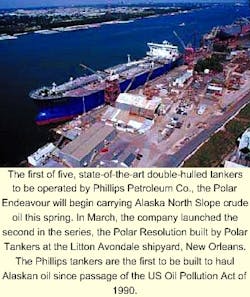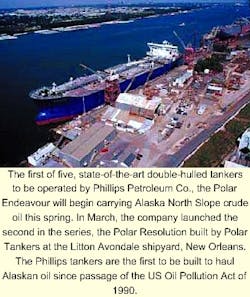Clarkson: Tanker business upturn to continue its run during 2001
Oil tankers are experiencing a record year, reports Clarkson Research Studies, London, in its most recent semiannual review of the world's tanker industries.
Earnings for oil tankers have doubled, it says, and summer 2000 tanker rates hit levels not seen for 30 years.
Tanker investment has so far been "restrained and the order book is lower" than 2 years ago, says the study. "We think the fundamentals are strong enough to carry the market through another good year, particularly if owners continue to play the game well."
It says 1999 was a poor year for tanker markets as crude exports fell with production cuts, but the Organization of Petroleum Exporting Countries (OPEC) has increased output in an attempt to curb rising prices.
The report says further increases in production may lower prices and boost oil demand growth that has been restrained by high prices.
Clarkson says the increase in long-haul exports is reflected in spot fixture data. Very large crude carrier (VLCC) spot fixtures at yearend 2000 had risen 15% while ultra large crude carrier (ULCC) spot fixtures rose 5%.
"VLCC demand from the Far East appears to be particularly strong. In addition, the US has been importing increased amounts of crude from West Africa.
"The overall outlook for tanker demand remains positive. Global economic growth is expected to slow slightly in 2001 but nonetheless remain strong. Oil demand is expected to increase by 2.4% and there appears to be ample supply as producers continue to increase output as the prices of the benchmark crudes have remained above 30/bbl."
Clarkson says as of fall 2000, the tanker fleet had 290.4 million dwt, of which 1.7 million were laid up and 5.4 million were in storage.
The report says that, although many ships were delivered in 1999, the order book increased to 46.7 million dwt, or 16% of the fleet, by the end of 2000. It explains that the strong market and the elderly age of the VLCC and Suezmax fleets (in both sectors 31% of the vessels were 30 years or older) have led to heavy ordering.

